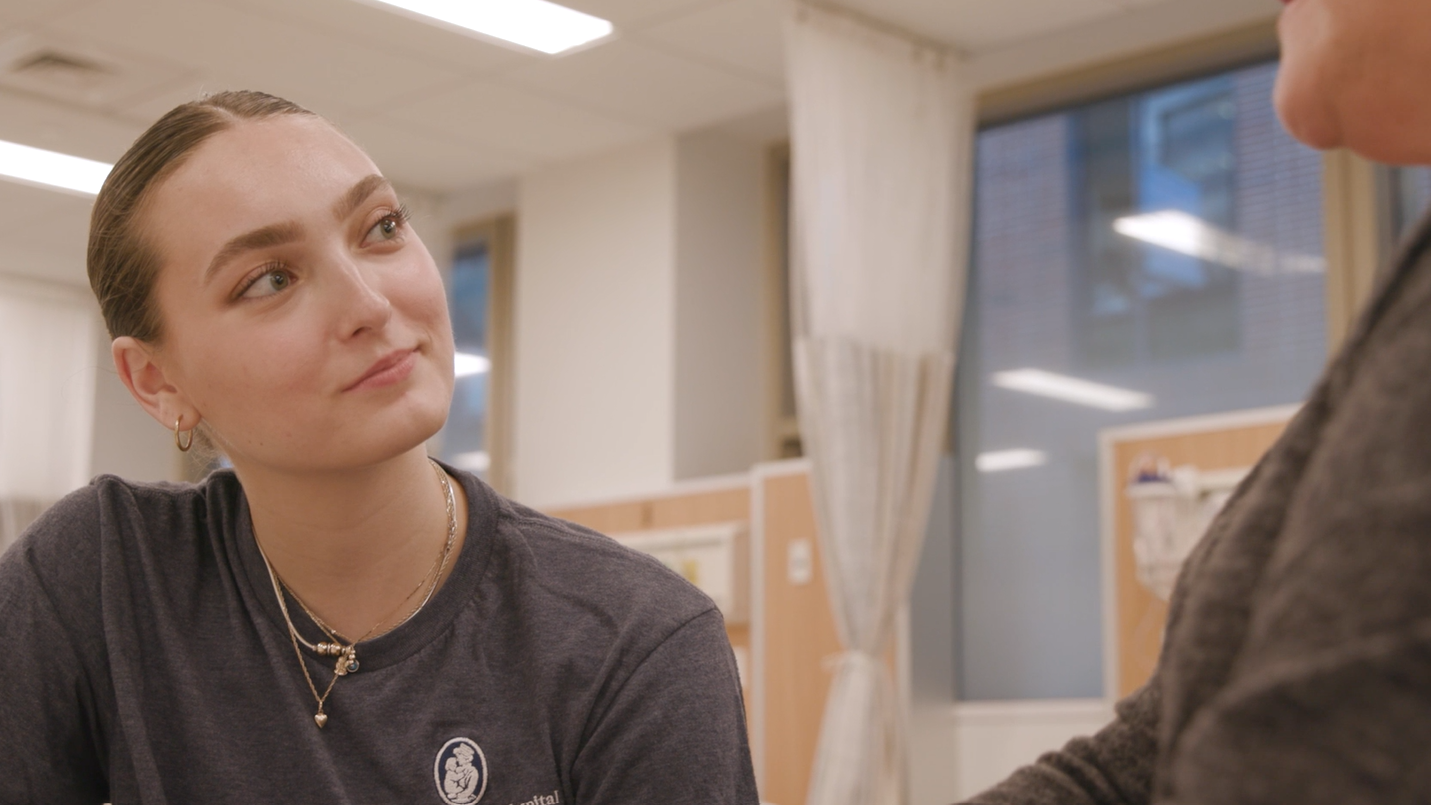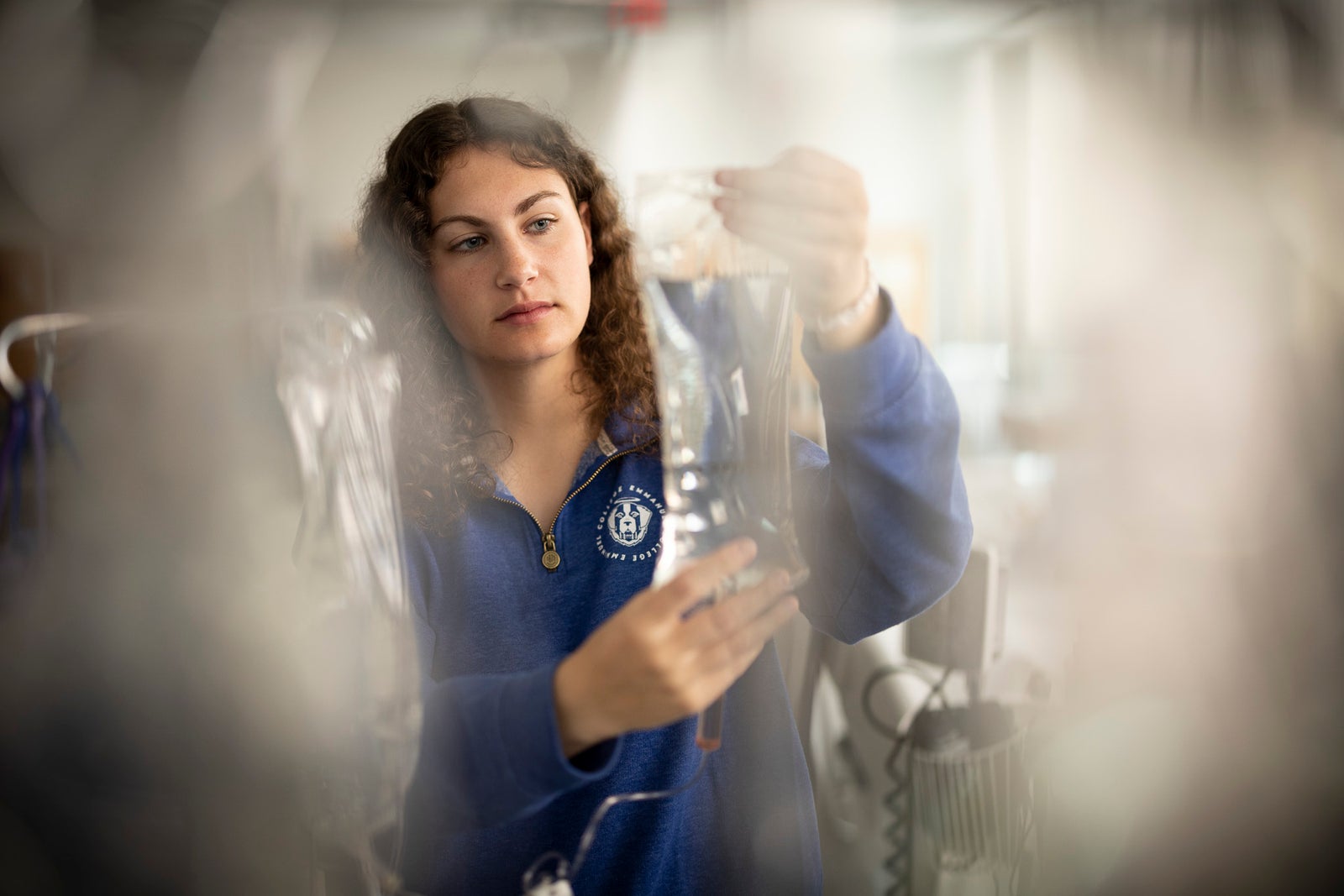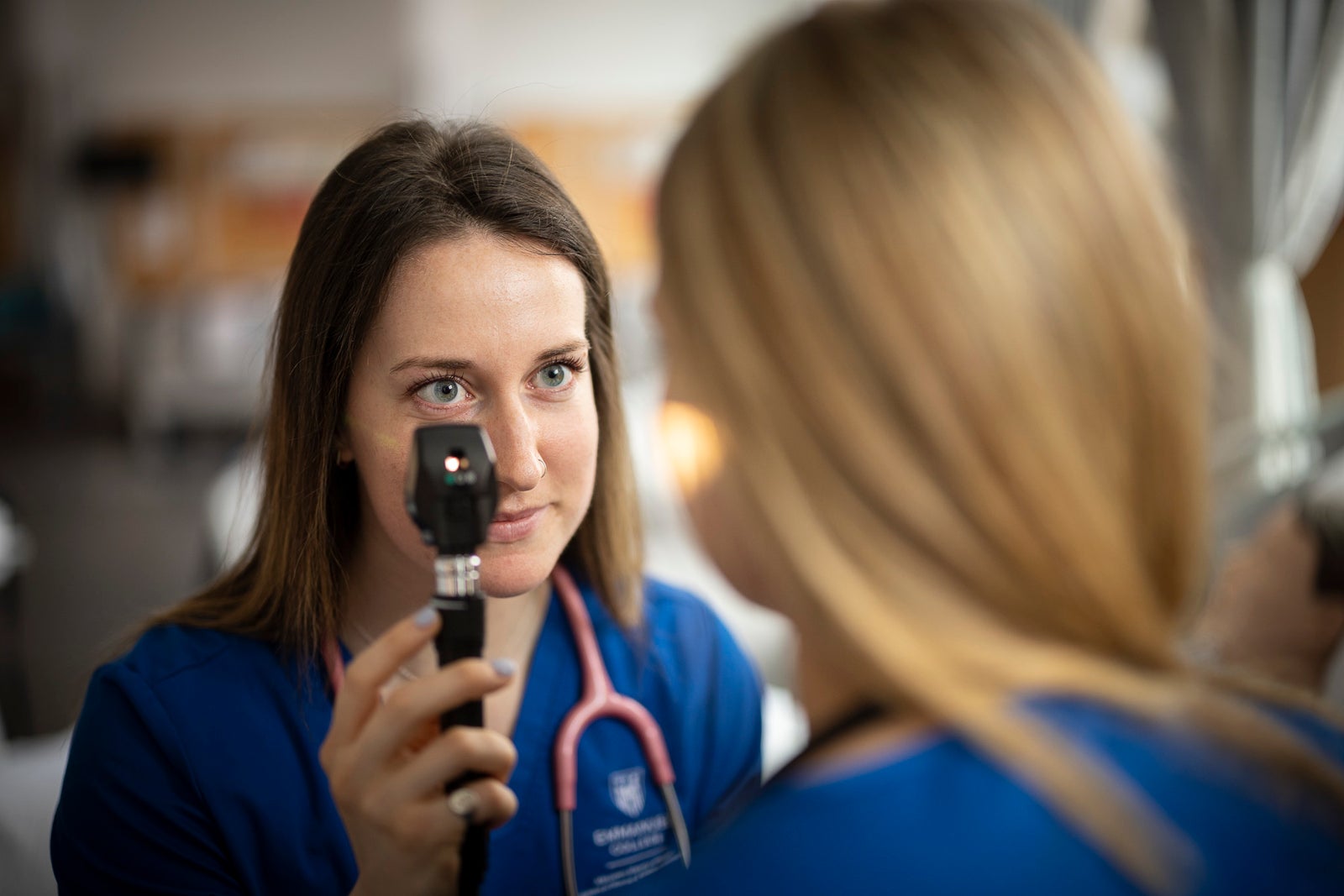Redefine compassionate, ethical, innovative patient care.
Nurses are on the front lines of patient care while shaping the future of healthcare, from hospitals and clinics to community health settings and leadership roles. As a nursing student at Emmanuel College, you’ll develop your own philosophy of nursing, grounded in compassion, ethics, and respect for the diversity of human experiences.
Through rigorous coursework and clinical placements across Boston’s top healthcare sites, you’ll build the knowledge and skills to think critically, communicate effectively, and provide patient-centered care. Emmanuel’s program prepares you to understand the cultural, social, economic, and political factors that shape health beliefs and behaviors, equipping you to lead with insight and empathy in an evolving healthcare landscape.
Emmanuel has been a leader in nursing education for over 40 years, offering a Master of Science in Nursing program as well as an RN to BSN online. For information regarding Emmanuel College's nursing application requirements, please click here.
The baccalaureate degree program in nursing and master's degree program in nursing at Emmanuel College are accredited by:
The Commission on Collegiate Nursing Education
655 K Street NW, Suite 750,
Washington, DC 20001,
202-887-6791
The Bachelor of Science in Nursing degree program at Emmanuel College has Full Approval Status from the Massachusetts Board of Registration in Nursing.
Commonwealth of Massachusetts Board of Registration in Nursing
250 Washington St
Boston, MA 02108
Telephone: (617) 973-0900 or (800)-414-0168
Student Satisfaction, By the Numbers
100%
100%
100%
100%
Hanna Johnson '25 | Nursing Major
As a nursing student, Hanna gained hands-on experience at Boston Children's Hospital, on the same floor where she was once a patient.
A Best-In-Class Experience
Get to know the people and programs that will define your academic journey.

Sophia Law ’25 Finds Purpose and Community in Nursing
After transferring to Emmanuel, Sophia embraced the nursing program, thriving in Boston’s top hospitals while discovering her passion for NICU care and patient advocacy.

Meet the Faculty
Our distinguished faculty publish, exhibit and research. Present, compose and chair. Inspire and collaborate.
The Curriculum
View the 2024-2025 Academic Catalog to find course titles, numbers and descriptions.
Requirements for B.S. in Nursing
- NURS1000 Nursing Seminar I
- NURS2000 Nursing Seminar II: History and Theory in Nursing
- NURS2150 Pathopharmacology I
- NURS2200 Health Assessment
- NURS2350 Pathopharmacology II
- NURS2400 Intro to Nursing (Clinical course)
- NURS3000 Nursing Seminar III: End of Life
- NURS3100 Adult Health I (Clinical course)
- NURS3200 Nursing Research (WI)
- NURS3300 Mental Health Nursing (Clinical course)
- NURS3400 Adult Health II (Clinical course)
- NURS3500 Nursing Ethics and Professional Responsibilities (ER)
- NURS3600 Culture and Diversity in Health Care (DM)
- NURS3700 Community and Public Health Nursing(Clinical course) (SJ)
- NURS3800 Maternity and Women's Health/Pedi (Clinical course)
- NURS4000 Nursing Seminar IV: Leadership and Professional Practice
- NURS4500 Nursing Synthesis & Capstone (Clinical)
Other required courses:
- BIOL1215 Introduction to Nutrition (SI) (NS)
- PSYCH1501 General Psychology (SA) (SS)
- BIOL1919 Anatomy and Physiology I for Nursing Professionals w/lab (SI-L) (NSL)
- PSYCH1503 Lifespan Growth and Development
- SOC1101 Introduction to Sociology (SA) (SS)
- BIOL1920 Anatomy and Physiology II for Nursing Professionals w/lab (SI-L) (NSL)
- MATH1117 Introduction to Statistics for Nursing Professionals (QA) (QR)
- CHEM1109 Introduction to Chemistry for Health Professionals (SI) (NS)
- BIO2019 Microbiology
The SON offers clinical experiences in a variety of settings. Emmanuel College maintains contractual agreements for these clinical experiences. Nursing students must meet the expectations of both the college and the assigned clinical agency regarding professional conduct, attire, health clearance, and other agency specific requirements. Individual clinical agency policies supersede Emmanuel College policies, and both the College and its students must adhere to all applicable clinical agency requirements.
The clinical clearance requirements for students enrolled in the Undergraduate Nursing Program include the following:
- Demonstration of Competency with Dosage Calculation and Safe Medication Administration
- Annual Physical, Health Clearance and Required DPH Immunizations (Covid, Tb, Tdap, MMR, Hepatitis B, Varicella, Annual Flu, Menningococcal)
- Cardiopulmonary Resuscitation Certification (American Heart Association: BLS for the Healthcare Provider). This is the only course accepted by all of our affiliating agencies. Online courses are not acceptable.
- Mandatory Clinical Orientation and Agency-Specific Pre-Clinical Requirements
- Background and Criminal History Checks Performed Annually
- Some clinical agencies require fingerprinting prior to placement
- Compliance with the Good Moral Character, as defined by state law Massachusetts General Laws Chapter 112, sections 74, 74A, and 76
Sample BSN Four-Year Plan
YEAR 1
FIRST SEMESTER
- BIOL1215 Introduction to Nutrition
- BIOL1919 Anatomy & Physiology I for Nursing Professionals
- PSYCH1501 General Psychololgy
- ENG1103 Introduction to Academic Writing
- NURS1000 Nursing Seminar 1
SECOND SEMESTER
- CHEM1109 Introduction to Chemistry for Health Professionals
- BIOL1920 Anatomy & Physiology II for Nursing Professionals
- General Requirement
- SOC1101 Introduction to Sociology
- INT1001 Pre-Internship Course
YEAR 2
THIRD SEMESTER
- PSYCH1503 Lifespan Growth & Development
- BIOL2019 Microbiology
- MATH1117 Introduction to Statistics
- NURS2150 Pathopharmacology
- NURS2000 History & Theory in Nursing/Service (Seminar)
FOURTH SEMESTER
- NURS2200 Health Assessment
- General Requirement
- NURS2350 Pathopharmacology II
- NURS2400 Intro to Nursing (Clinical)
YEAR 3
FIFTH SEMESTER
- NURS3100 Adult Health I (Clinical)
- NURS3200 Nursing Research
- PHIL3020 Nursing Ethics in Practice
SIXTH SEMESTER
- NURS3300 Mental Health Nursing (Clinical)
- NURS3400 Adult Health II (Clinical)
- NURS3000 Nursing Seminar III: End of Life
- NURS3600 Culture and Diversity in Health Care (Travel Option)
YEAR 4
SEVENTH SEMESTER
- NURS3800 Maternity and Women's Health/Pediatrics (Clinical)
- NURS3700 Nursing in the Community (Clinical)
- General Requirement
EIGHTH SEMESTER
- NURS4500 Nursing Synthesis and Capstone (Clinical)
- NURS4000 Nursing Seminar IV: Leadership and Professional Practice
- General Requirement
- General Requirement
Upon completion of this program, students will:
- Expand a personal philosophy of nursing through reflection on the Catholic intellectual tradition to effect positive outcomes for care-recipients within the context of their environments.
- Assume accountability for evidence and knowledge-based nursing practice and responsibility for involvement as a citizen knowledgeable in inter-professional health care systems.
- Practice as a professional nurse whose care-giving activities reflect the analysis of theoretical knowledge from the liberal arts, sciences, nursing and evidence-based practice.
- Integrate into the culture of nursing the concepts of caring that foster a relationship between caregiver and care-recipient that results in the achievement of mutually agreed upon outcomes on the health/illness continuum.
What can I do with a degree in nursing?
A degree in nursing can lead to a variety of career paths within the healthcare industry. Some potential career options include:
- Registered Nurse (RN): RNs work in a variety of healthcare settings and provide direct patient care. They may work in hospitals, clinics, nursing homes, or schools.
- Nurse Practitioner (NP): NPs are advanced practice nurses who have additional education and training beyond an RN. They may provide primary care, prescribe medication, and order diagnostic tests.
- Clinical Nurse Specialist (CNS): CNSs are specialized RNs who provide expertise and support to other nurses in a specific area of healthcare, such as critical care or oncology.
- Nurse Educator: Nurse educators teach nursing students in academic settings, such as colleges and universities.
- Nurse Administrator: Nurse administrators oversee healthcare facilities, manage staff, and ensure compliance with healthcare regulations.
- Public Health Nurse: Public health nurses work to improve the health of communities through education, disease prevention, and community outreach.
- Nurse Researcher: Nurse researchers conduct studies and research related to nursing and healthcare, with the goal of improving patient care and outcomes.
Nurses need a variety of skills to be successful in their profession, including:
- Clinical skills: Nurses must have a solid understanding of anatomy, physiology, pharmacology, and medical procedures to provide quality patient care.
- Communication skills: Nurses need to be able to communicate effectively with patients, their families, and other healthcare professionals to ensure that everyone is on the same page regarding the patient's care.
- Critical thinking: Nurses must be able to analyze complex situations and make decisions quickly and effectively.
- Compassion and empathy: Nurses work with patients who are often in pain or distress, so it's important for them to be compassionate and empathetic.
- Attention to detail: Nurses must be meticulous and detail-oriented when administering medications, charting patient data, and carrying out medical procedures.
- Time management: Nurses must be able to prioritize tasks and manage their time effectively to provide efficient patient care.
- Cultural competency: Nurses need to be aware of and sensitive to cultural differences in order to provide appropriate care to patients from diverse backgrounds.
- Technological proficiency: With the increasing use of technology in healthcare, nurses must be comfortable with electronic health records (EHRs) and other digital tools used in patient care.
Where Essential Values and Skills Meet the Real World
Along with areas of knowledge and major requirements, you will cultivate essential values in the classroom and complete two courses in each area:
- Social Justice (SJ): Develop knowledge, skills, values and motivation to participate beneficially in activities of personal and public concern.
- Diversity & Multiculturalism (DM): Understand the complexity of identity the historical truths of different cultural perspectives to address bias and examine contemporary social issues.

One hundred percent of Emmanuel students complete an internship as part of the core curriculum. In a city as dynamic as Boston, your options are bound only by the limits of your curiosity.
As a nursing student, you will complete clinical rotations in a number of areas at many local hospitals. Gain nursing experience in mental health, community and public health, maternity and women’s health, pediatrics and more at area hospitals and health care organizations.

In all majors, the Capstone Experience involves completing a significant piece of work that requires the integration and application of learning from multiple courses.
In your nursing capstone, you will have the opportunity to engage in a clinical experience with a professional nurse in the field, integrating the role of nurse as an advocate, collaborator and leader into your practice. This will allow you to further develop your skills as a nurse generalist and explore professional issues.

Nursing Spotlight
See more stories and news related to the Maureen Murphy Wilkens School of Nursing & Clinical Sciences


